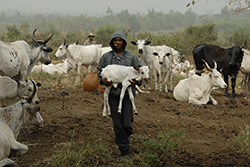Importance
Ticks are among the most important vectors of human and animal diseases caused by protozoa, rickettsiae, bacteria, viruses and even helminths of vertebrates. They rank second only to mosquitoes as vectors of life threatening or debilitating human and animal diseases. Moreover, ticks transmit a greater variety of infectious agents than any other arthropod group.

Cattle farming in Benin |
Ticks are also important as pests, affecting humans, livestock and wildlife. Apart from the discomfort they cause, these blood-feeding ectoparasites cause considerable production losses especially to improved animal breeds in the Afrotropical region. Each engorging female tick takes between 1 and 5 ml of blood depending on species and size.
Several Rhipicephalus spp. and Ixodes rubicundus cause paralysis in cattle, sheep, goats or antelope whereas Hyalomma truncatum causes sweating sickness in cattle as a result of toxicosis.
Especially ticks with long mouthparts cause considerable direct damage to hides of cattle. Secondary infections can cause septic wounds or abscesses, and lesions on the teats of cows may affect milk production.
